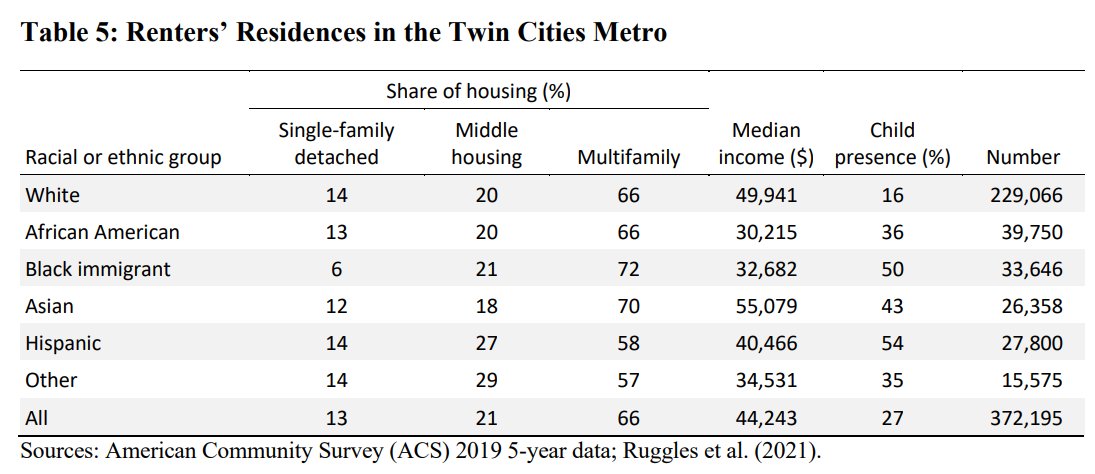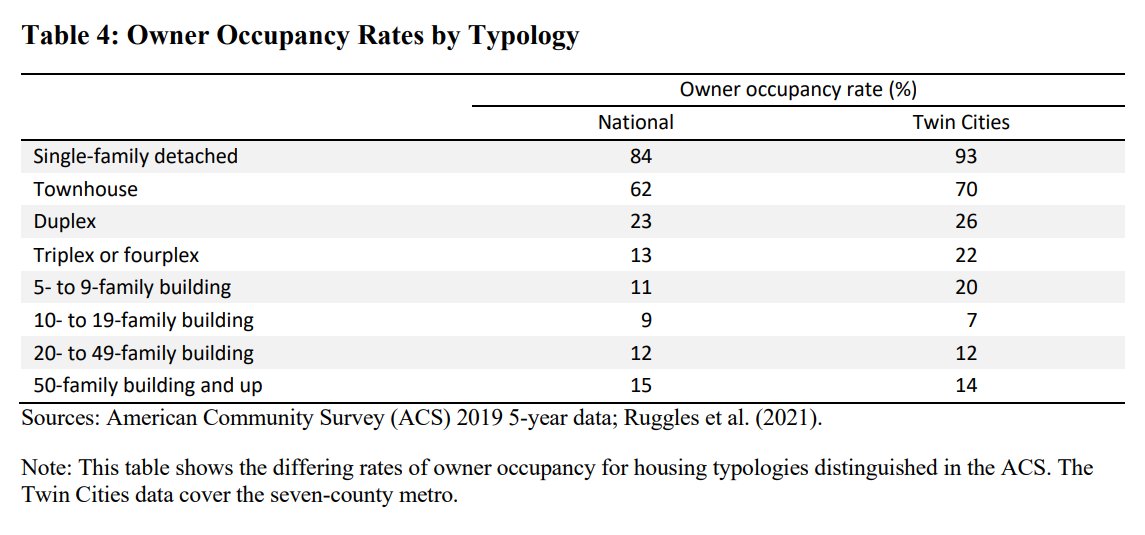NEW RESEARCH: @MaryJoWebster and I document that multi-family zoning is strongly correlated with racial integration in the Twin Cities. In parallel, Matt Resseger finds the same in Greater Boston. Here's a brief summarizing & contextualizing both papers.
mercatus.org/publications/u…
mercatus.org/publications/u…
@MaryJoWebster @MaryJoWebster and I find that a multifamily-zoned block group in the Twin Cities metro has 21 percentage points more non-White residents than a similarly situated block group zoned single-family only. 

Matt Resseger's research - this began as his Harvard dissertation 10 years ago - is even better. He's able to use city block boundaries in Greater Boston to show how zoning results in racial variation across the street.
mercatus.org/publications/u…
mercatus.org/publications/u…
(More to come - I'm threading between meetings today)
If you know anything about housing and race in the #TwinCities metro, it's that the Black-White homeownership rate gap is the largest in the country. It's mindblowing: Black households making $100k are about as likely to rent as White hh making $20k. 

That's not an artifact of Minnesota's heavily immigrant Black population. Black-headed households with an immigrant present are slightly likelier to own their dwelling than entirely US-born Black-headed households.
(Also interesting: the poorest Asian immigrant groups in the Twin Cities have high homeownership rates, which is possible because they often have more than 2 earners per household).
So if it's not immigrant status, what is holding back the Twin Cities black population? We found that the Twin Cities has both the largest EXPLAINED and UNEXPLAINED Black-White homeownership gaps. So it's partly obvious things like income & marriage, but also unobservables. 

Another thing you probably know about the Twin Cities area is that racial covenants excluding non-Whites were commonly used from 1910-1950, as @MapPrejudice showed. (BTW, @mikejcorey helped with our zoning data and now works on the covenant data) 

@MapPrejudice @mikejcorey @SoodAradhya showed that old covenants correlate to 2010 racial residential patterns. Part of the reason for that finding seems to be that covenanted block groups are much more likely to be zoned single-family only today. 

We can replicate @SoodAradhya's finding, but we can also put covenants and zoning data into the same regression. We find that zoning is entirely robust & has more explanatory power. 

@SoodAradhya Another thread in this paper is sussing out some of the impacts of zoning for PUDs and middle housing. PUDs are taking over the growing edge of the Twin Cities metro like kudzu (right, @ElkinsForHouse?), and they include a mix of housing types. 

As the previous table shows, zones that allow middle housing are quite diverse, with a lot of single-family detached as well as middle and multifamily housing. However, we coded Bloomington's main zone, which technically allows duplexes, as single family. It's too restrictive.
We also looked for evidence that people of different cultures prefer different types of housing. That is, conditional on owning/renting and PUMA of residence, do some races/ethnicities tend toward some housing types? That could explain our topline finding.
In the Twin Cities, we find no statistically significant evidence for typology preferences. But it's noisy data. And nationally, we find that *black owners* and *white renters* each prefer detached homes more. 

This is a roundabout way to get to the obvious conclusion: there's a straightforward "chain of exclusion" (h/t @rolfpendall): Zoning determines typology; typology is closely linked to tenure; tenure varies systematically by race. 

We already saw the evidence that zoning determines typology (or is at least super correlated with it) 

And we can similarly show that there are stark differences in tenure (that is rental/ownership) by typology. 

Finally, we return to the ownership difference between whites and non-Whites (especially Black households), which is starker in the Twin Cities than anywhere else. 

For policymakers promoting integration, there's probably long-term value in promoting minority homeownership. But the biggest, most efficient margin for integration is in allowing multifamily housing in all school districts, all neighborhoods. 

In my contextual policy brief, I discuss three of the possible policy interventions:
1) Middle housing (aka "ending single family zoning")
2) Traditional apartment zoning
3) All-of-the-above zoning
mercatus.org/publications/u…
1) Middle housing (aka "ending single family zoning")
2) Traditional apartment zoning
3) All-of-the-above zoning
mercatus.org/publications/u…
Ending single family zoning is certainly attractive, and it's been the most celebrated achievement by @MoreNeighbors, @Jacob_Frey, @janneformpls & co. But as many have noted, progress there is slow. And Bloomington's long-term failure to build "allowed" duplexes also tells.
I'm more optimistic about traditional apartment zoning. It's not beautiful, but it does integrate schools, commutes, etc. The old breed of Minnesota zoning reformers, like Myron Orfield, focused here. All locations aren't created equal, of course. 

Finally - and this is the future market urbanists want - you can have what I call #AllOfTheAbove zoning. When you take a traditional multifamily zone and map it everywhere, it can host a diversity of housing types. Unless prices are extreme, it won't all be built multifamily.
Houston and Tokyo are market urbanist superstar cities because of their #AllOfTheAbove zoning. And @mayorauburn showed that small cities can do the same - create residential zones for all types of residential. 





@mayorauburn Fin! I hope you enjoyed the papers and I'd love to hear your feedback.
• • •
Missing some Tweet in this thread? You can try to
force a refresh














